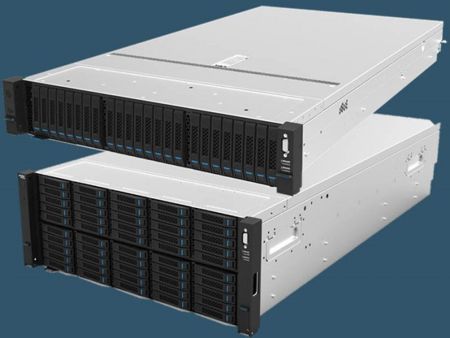Inspur: M6 Four-Socket Servers
Supporting 3rd gen Intel Xeon scalable processor and Optane persistent memory 200 series
This is a Press Release edited by StorageNewsletter.com on June 26, 2020 at 2:25 pmInspur Electronic Information Industry Co.,Ltd released two M6 series 4-socket servers supporting the 3rd Gen Intel Xeon scalable processors, including NF8260M6, a 2U 4-socket server optimized for cloud scenarios, and NF8480M6, a 4U 4-socket server for mission critical application scenarios of traditional enterprise customers.

The Xeon scalable processor supports 4-socket and 8-socket servers, with a single CPU of up to 28 cores. Bfloat16 numeric format is supported for the first time in a mainstream CPU to enhance the AI deep learning performance and computing speed. Meanwhile, application optimization is carried out in cloud computing, in-memory database, deep learning and virtualization.
The firm released a 4-socket server supporting the platform, aiming to provide customers with higher density, greater performance, and reliable computing power to support digital transformation.
Mining data value with higher compute density
NF8260M6 can support 4 processors in a 2U space, up to 112 cores, offering a higher compute density which can cut down on 50% of space use, 40% of operation and maintenance cost, and 7% of power consumption, thus reducing the overall TCO as compared to 2U 2-socket servers.
The two 4-socket servers support up to 48DIMM, DDR4 and the new Optane persistent memory (PMem) 200 Series, providing increased memory capacity. Each socket provides a maximum of 4.5TB memory (6x512GB Optane PMem + 6x256GB DDR4 DRAM) to support application scenarios such as in-memory database, data warehousing, SAP HANA and OLAP (online analytics processing), to assist customers in the analysis and mining of massive data sets, facilitate decision-making and marketing, and create greater value and benefits for customers. In addition, the non-volatile feature of Intel Optane PMem ensures the integrity of memory data in abnormal circumstances such as sudden power failure.
Load balancing to meet different business needs
Both servers adopt balanced topology design to ensure balanced distribution of business load and improve overall business performance, while reducing cross-CPU service processing delay, providing more efficient data processing solutions for load balancing, deep package inspection (DPI) and other scenarios.
For IO expansion, NF8480M6 and NF8260M6 onboard can support up to 6 standard PCIe slots to meet more than 90% of the customer’s business needs without additional Riser expansion.
Additionally, they can be expanded more through Riser to meet different customer needs such as balanced expansion, heterogeneous computing, and cost performance. Moreover, Inspur 4-socket servers provide different disk solutions for customers with different storage requirements to meet high IO/s, cost performance and mainstream business needs respectively, so as to achieve on-demand distribution.
Stability and reliability to ensure key BC
It is important for 4-socket servers to have strong single-machine processing capacity, and also to have good RAS characteristics to ensure the continuity of critical businesses. The 4-socket server adopts system fault-tolerant technology, such as thermal switching, intelligent detection and intelligent management, at the chip, component, machine and system levels, which can isolate the impact of hardware and signal errors on the system, reduce the risk of unplanned downtime, and further improve product reliability, so as to ensure BC and better data stability.
William Chen, Deputy GM server product line, said that the principle of “extreme scenario design” was adopted in Inspur servers that combine platform and modularization strategies for specific application scenarios of users, so that each product can be expanded according to application requirements, helping enterprises achieve digital transformation.
Read also:
Inspur AFA AS5000G5-F With Dual-Port Optane SSD
Up to 560,000 IO/s, 2.4GB/s bandwidth and 22μs read response time
December 27, 2019 | Press Release














 Subscribe to our free daily newsletter
Subscribe to our free daily newsletter

